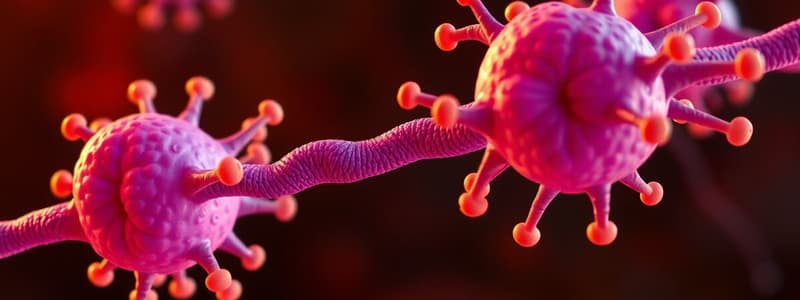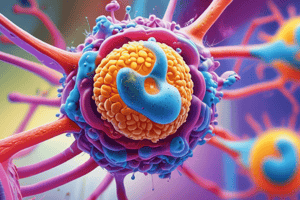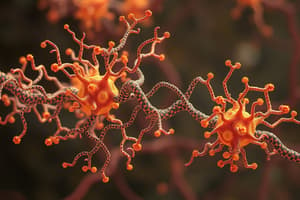Podcast
Questions and Answers
Which type of chemical interaction is LEAST likely to be involved in the binding of a substrate to a receptor?
Which type of chemical interaction is LEAST likely to be involved in the binding of a substrate to a receptor?
- Hydrophobic interactions
- Hydrogen bonding
- Ionic bonding
- Nuclear Fission (correct)
Receptors primarily function to synthesize new substrates within the cell.
Receptors primarily function to synthesize new substrates within the cell.
False (B)
Name two types of substrates that commonly bind to receptors on target cells to initiate a response.
Name two types of substrates that commonly bind to receptors on target cells to initiate a response.
Neurotransmitters and hormones
Receptors are important drug targets and are primarily composed of ________.
Receptors are important drug targets and are primarily composed of ________.
Which type of receptor directly forms a hydrophilic tunnel through the cell membrane?
Which type of receptor directly forms a hydrophilic tunnel through the cell membrane?
The primary role of receptors in cell communication is to:
The primary role of receptors in cell communication is to:
Which statement regarding the function of receptors is most accurate?
Which statement regarding the function of receptors is most accurate?
G-protein coupled receptors consist of a single protein with five transmembrane sections.
G-protein coupled receptors consist of a single protein with five transmembrane sections.
All receptors bind to the same type of substrate, ensuring uniform cellular responses throughout the body.
All receptors bind to the same type of substrate, ensuring uniform cellular responses throughout the body.
What type of protein are ion channels made of?
What type of protein are ion channels made of?
G-Protein Coupled Receptors activate G-proteins through a conformational change induced by a ______ binding to the receptor.
G-Protein Coupled Receptors activate G-proteins through a conformational change induced by a ______ binding to the receptor.
Match the types of bonds/interactions with their description:
Match the types of bonds/interactions with their description:
Match the receptor type with its primary mechanism of action:
Match the receptor type with its primary mechanism of action:
Which of the following ions is NOT typically associated with ion channel receptors?
Which of the following ions is NOT typically associated with ion channel receptors?
Kinase receptors require G-proteins to activate enzymes.
Kinase receptors require G-proteins to activate enzymes.
What is the typical cellular response time (in general terms) for ion channel receptors, compared to other receptors?
What is the typical cellular response time (in general terms) for ion channel receptors, compared to other receptors?
Flashcards
Receptors
Receptors
Proteins that serve as drug targets in the body.
Receptor Function
Receptor Function
Carry messages between cells. They receive signals from other cells.
Receptor Substrates
Receptor Substrates
Molecules that bind to receptors to trigger a response.
Neurotransmitters
Neurotransmitters
Signup and view all the flashcards
Hormones
Hormones
Signup and view all the flashcards
Receptor Binding Interactions
Receptor Binding Interactions
Signup and view all the flashcards
Covalent Bonds
Covalent Bonds
Signup and view all the flashcards
Hydrophobic Interactions
Hydrophobic Interactions
Signup and view all the flashcards
Ion Channel Receptors
Ion Channel Receptors
Signup and view all the flashcards
Ion Channel
Ion Channel
Signup and view all the flashcards
G-Protein Coupled Receptors
G-Protein Coupled Receptors
Signup and view all the flashcards
G-Proteins
G-Proteins
Signup and view all the flashcards
7 Transmembrane Receptor
7 Transmembrane Receptor
Signup and view all the flashcards
Kinase Receptors
Kinase Receptors
Signup and view all the flashcards
Bifunctional Receptor/Enzyme
Bifunctional Receptor/Enzyme
Signup and view all the flashcards
Study Notes
- Receptors are proteins, which make up the most important drug targets in medicine
- Receptors carry messages across the "gap"
- Communication occurs primarily from the central nervous system
- Receptors receive messages coming from other cells
- Neurotransmitters are a type of substrate that binds receptors on a target cell
- Hormones are another kind of receptor that binds to receptors on target cells throughout the body
- Hydrogen bonding, ionic bonding, hydrophobic interactions, and covalent bonds can occur
Receptor Superfamilies
- Able to categorize receptors by: ion channel receptors, G-Protein Coupled Receptors, Kinase Receptors, and Intracellular Receptors
Ion Channel Receptors
- Respond in milliseconds
- They are made up of proteins that transverse the cell membrane and provide a hydrophilic tunnel
- They are specific for specific ions (Na+, Ca2+, Cl-, K+)
- Protein subunits are glycoproteins
G-Protein Coupled Receptors
- Some of the most important drug targets in medicinal chemistry
- Receptor binds a messenger leading to an induced fit
- They are membrane-bound proteins that activate G-proteins
- Single protein with seven transmembrane sections
Kinase Receptors
- Activate enzymes that do not require a G-protein
- Receptors are bifunctional receptor/enzyme, activated by hormones
Intracellular Receptors
- Reside inside a cell
- Single protein containing a C-terminus binding site
Studying That Suits You
Use AI to generate personalized quizzes and flashcards to suit your learning preferences.




